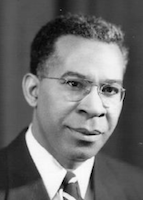Oliver Cox | |
|---|---|
 | |
| Born | August 24, 1901 Port of Spain, Trinidad |
| Died | September 4, 1974 |
| Nationality | Trinidadian-American |
| Education | Central YMCA High School Chicago
Lewis Institute Northwestern University Law (1928) U. Chicago Department of Economics M.A.(1932) U. Chicago Department of Sociology Ph.D. (1938) [1] |
| Notable work | Caste, Class, and Race: A Study in Social Dynamics, 1948
Foundations of Capitalism, 1959 Capitalism as a System, 1964 Race Relations: Elements and Social Dynamics, 1976 |
Oliver Cromwell Cox (24 August 1901 – 4 September 1974) was a Trinidadian-American sociologist. Cox was often misconceived as a Marxist due to his focus on class conflict and capitalism, however, Cox fundamentally disagreed with Marx's analysis of Capitalism. While Marx and other classical economists viewed foreign trade as trade in surpluses, Cox felt that foreign trade was the primary driving force in capitalist development. For Cox, capitalist systems were not isolated, but rather there was an interconnected network of global capitalist systems.[2]
Cox was born into a middle-class family in Port of Spain, Trinidad and emigrated to the United States in 1919. Growing up in Port of Spain, Trinidad, Cox was removed from the racial discrimination and hostilities that are present in the United States. Cox grew up as a member of the majority group, in a predominantly black world where white Europeans were considered outsiders.[3] This perspective influenced Cox's research and sociological exploration.
Cox was a founding father of the world-systems perspective, which is a socioeconomic system that encompasses part or all of the world.[4] Additionally, Cox was an important scholar of racism and its relationship to the development and spread of global capitalism, and a member of the Chicago School of Sociology.[5] In 1929 he developed poliomyelitis (polio), causing both his legs to be permanently crippled and that was when he gave up his plans to study law. He was the son of William Raphael Cox and Virginia Blake Cox.
- ^ Herbert M. Hunter
- ^ Watson, Hilbourne A. (2014). "Oliver Cromwell Cox's understanding of capitalism and the problem of his materialist perspective". Canadian Journal of Latin American and Caribbean Studies / Revue canadienne des études latino-américaines et caraïbes. 39 (3): 382–402. doi:10.1080/08263663.2014.1013287. ISSN 0826-3663. JSTOR 26588039. S2CID 142941993.
- ^ Cite error: The named reference
10.2307_274575was invoked but never defined (see the help page). - ^ Wallerstein, Immanuel (2000). "Oliver C. Cox As World-Systems Analyst". Research in Race and Ethnic Relations. 11: 173–183.
- ^ Cheseboro, Anthony (1998). "Conflict and Continuity: E. Franklin Frazier, Oliver C. Cox and the Chicago School of Sociology". Journal of the Illinois State Historical Society. 92 (2): 150–172.
© MMXXIII Rich X Search. We shall prevail. All rights reserved. Rich X Search
